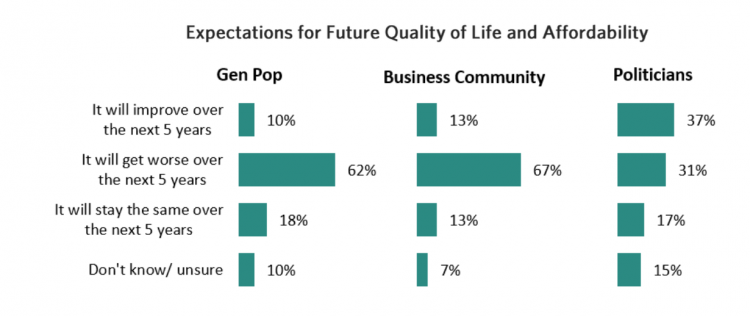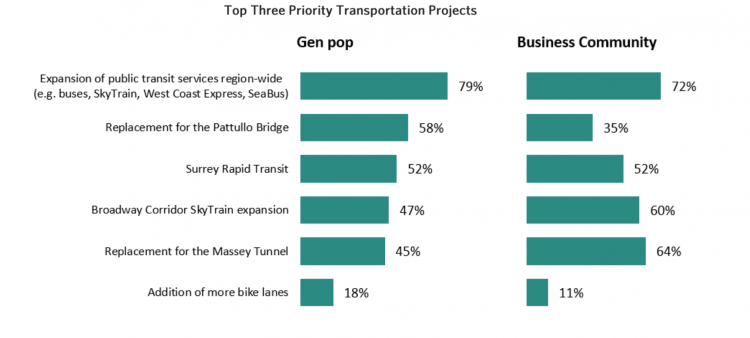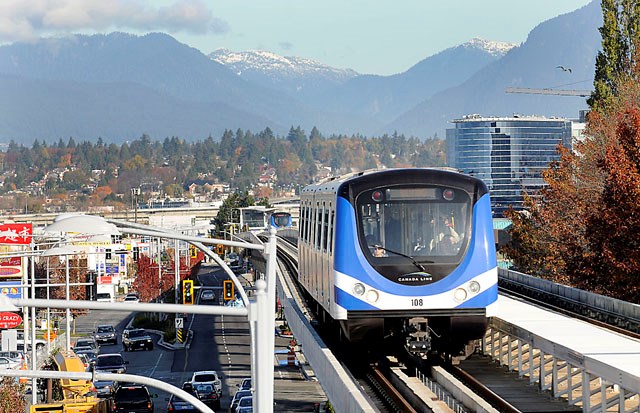In focusing on housing, Greater Vancouver residents and businesses believe municipal governments have missed the mark on transportation issues, and local politicians know it.
Mustel Group and FleishmanHillard HighRoad, in partnership with the Greater Vancouver Board of Trade, published Wednesday what GVBOT CEO Iain Black called “an experiment” – a guidebook for municipal leadership hopefuls based on survey feedback from the region’s general public, business community and political leadership.
According to the survey, 68 per cent of Greater Vancouver residents say their municipality has permitted too much housing, and that they are concerned transit infrastructure and roads cannot support the region’s growing population. Fifty-two per cent of business respondents agreed.
The results highlight a disconnect between the concerns of the region and how they have been handled by elected officials.
Forty-seven per cent of politicians believe municipalities have successfully struck a balance between adding new housing and managing subsequent transportation needs.
That belief, however, does come with a concession: 65 per cent admit the public thinks too much housing has been permitted in the region.
“The public is clear about wanting action on housing,” explained Anna Lilly, senior vice-president and partner at FleishmanHillard HighRoad.
“However there’s real concern about what people are calling overdevelopment,” she added. “There’s a real tension there.”
Unsurprisingly, concerns about the balance between transportation and housing are underscored by the widely held view that quality of life and affordability in Greater Vancouver has declined over the last five years.
While political candidates were most likely to hold this view (82 per cent), they were also the most optimistic that conditions will improve over the next five years.
By comparison, 67 per cent of the region’s business community believe affordability will get worse, as does 62 per cent of the public.

Again, the results of the VoteLocal survey highlight a slight disconnect between the views held by politicians, and those held by voters.
The general public and business community want municipal spending to prioritize local road maintenance and traffic management ahead of any other issue, even though residents generally listed housing affordability as the highest priority in their municipality, followed by transportation, and then overdevelopment.
By contrast, politicians placed planning and permitting for new developments at the top of their spending priority list.
Overall, 60 per cent of the business community believe municipal governments are on the wrong track. Residents were largely split on the issue. In both groups, those that held this belief cited transportation as a top reason why – second only to local issues and negative political feedback.
"We asked them why," said Evi Mustel, owner of Mustel Group. "Transportation is one of the key issues."
Potentially complicating how political candidates address transportation in Greater Vancouver is the fact that half of the region’s current mayors will not be seeking re-election.
“This is largely unprecedented,” Translink CEO Kevin Desmond told a group of around 100 political leaders at the survey launch event in New West.
“Half of my governing body…will change,” he added. “We’re going to have to work with a new Mayors’ Council, make sure we’re still on board with the same priorities.”
Affordable housing (23 per cent), bureaucracy and spending (20 per cent), accountability, transparency and consultation (17 per cent) were other reasons given by the business community for why they think local governments have lost their way.
Nearly three-quarters of businesses said housing affected their ability to recruit and retain employees.
"These survey results confirm what our members and local business leaders have been telling us for a long time – that concern and frustration is growing across our region over affordability, traffic congestion, planning and permitting delays, and the lack of a cohesive region-wide strategy for economic development,” stated Black in a release.

A quarter of politicians believe councils’ biggest achievement over the last four years was in addressing housing issues.
When asked what municipalities haven’t been able to accomplish – but what politicians wished they had – transportation topped the list, specifically public transit expansion and improvements (20 per cent), general transportation issues (16 per cent) and reduced traffic congestion (7 per cent).
"Clearly voters are very anxious about affordability, and they're sensing a real erosion of their quality of life," said Lilly. "There's the sense that there has been a lot of change and that it's come quite fast."
The survey polled participants on a variety of existing policies, and on what they would like to see next.
The general population and business community largely supported taxing empty homes, limiting foreign capital in B.C.’s housing market and measures to curb speculation, with the former group more strongly in favour of all three.
A quarter of politicians noted they intended to stay the course on housing and only approve density already approved in community plans; 22 per cent plan to approve higher densities in certain neighbourhoods. Another 14 per cent aim to be more bold in approving density in all neighbourhoods, even if many residents do not support such changes.
The top transportation priority for residents and the business community is the expansion of regional public transit services. The next priorities for residents are the Pattullo Bridge replacement and Surrey rapid transit. For business members: replacing the Massey Tunnel and the Broadway Corridor SkyTrain extension.
On other issues, the survey found the business community was:
- 85 per cent in favour of local government working with the provincial government on ridesharing
- 71 per cent in favour of the Trans Mountain pipeline project
- 68 per cent in favour of a single regional police force
- 68 per cent in favour of amalgamation
- 54 per cent in favour of pursuing mobility pricing
- 51 per cent satisfied and 50 per cent not satisfied with community engagement and consultation
The VoteLocal survey randomly sampled 533 Metro Vancouver adults, 184 GVBOT members and 93 current mayors, councillors and electoral candidates.



